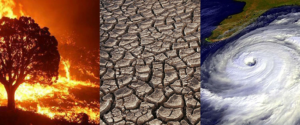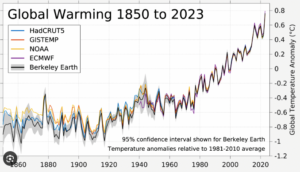Reckless Leadership; Ignore Climate Science, deny the Consequences

The current administration’s war on science took another form this week a Department of Energy press release proclaiming Global Heating (a well-documented fact) and it’s observed impacts around the globe did not merit more than casual acknowledgement in place scientific facts. and a meaningful mitigation policy. Instead, according the Trump administration’s Dept. of Energy official misrepresentations of the agency’s science-based findings and reinterpretation of the facts. This week public was told that the very energy policies now taking the form of national swift back to fossil fuels, lead by the President of the United States who hailed the return of COAL as new national energy priority, found an ally in his appointment of Chris Wright to head the Dept of Energy.
Secretary of Energy Chris Wright prior to joining the Trump Administration as Secretary of Energy in February 2025, was the CEO of Liberty Energy, which is one of North America’s largest hydraulic fracturing (oil and gas fracking) companies.
In a news conference earlier this week, Wright summed up the DOE report’s of an emerging global climate crisis as … “Climate change is real, and it deserves attention. But it is not the greatest threat facing humanity.” It seems by Weights’ statement, which neared the point of complete Climate Science denial and the agency’s own findings and recommendations, entered the stage with a new national energy; ignoring the emerging global climate crisis.
Scientists whose work appeared in the DOE 151-page Climate report decried Wright’s take on the alarming report, and its conclusions as “fundamentally misrepresenting” their research and findings. “It’s really surreal to think that’s where we are in 2025,” Jennifer Jacquet, a professor of environmental science and policy at the University of Miami, told Bloomberg.
The scientific consensus of the DOE study is unequivocal: rising greenhouse gas emissions, primarily from human activities, are the principal driver of global climate change and represent a rapidly intensifying threat to humanity. The agency’s conclusions were no surprise to anyone following the subject and was in synch with earlier reports, e.g., leading organizations such as the Intergovernmental Panel on Climate Change (IPCC), NASA, the World Health Organization (WHO), and other science-based sources all concluding that global impacts from GHG (greenhouse gas emissions) are accelerating along with associated consequences impacting most, if not all life on the planet.

Key Scientific Conclusion
DOE report, summary quote:
“Climate change is the single biggest health threat facing humanity… The impacts are already harming health, through air pollution, disease, extreme weather events, forced displacement, and mental health pressures.”
Major Threats to Humanity from Rising Greenhouse Emissions
1. Extreme Weather and Climate Disasters
More frequent and severe heatwaves, droughts, floods, hurricanes, wildfires, and storms, leading to loss of life, destruction of property, and infrastructure damage.
2. Human Health Risks
Increased deaths and illness from extreme heat, undernutrition, malaria, diarrheal diseases, respiratory and cardiovascular illnesses from worsening air quality, and mental health crises.
Greater incidence of vector-borne and water-borne diseases, and increased spread of emerging pathogens.
3. Food and Water Insecurity
Reduced agricultural yields, disruption of food systems, and increased risk of famine.
Increased water scarcity due to droughts, altered rainfall patterns, and shrinking freshwater resources.
4. Rising Sea Levels
Flooding and permanent inundation of coastal areas, threatening hundreds of millions with loss of homes, livelihoods, and displacement.
5. Ecosystem and Biodiversity Loss
Disruption of ecosystems, extinction of species, and reduced capacity of nature to provide vital services (like clean air and water).
6. Forced Migration and Human Security
Climate-driven displacement, migration, and heightened risks of conflict over resources, undermining stability and human rights.
7. Economic and Social Disruption
Billions of people, especially the most vulnerable (the poor, elderly, children, and those in developing countries), face increased poverty, damage to livelihoods, and reduced access to health care and social support.
Human activities (burning fossil fuels) are the main cause of increased greenhouse gases and observed global warming since the mid-20th century.
Current warming (~1.1–1.2°C above pre-industrial levels) is causing widespread and dangerous disruption to climate systems, ecosystems, and human society.
Every additional increment of warming escalates risks; increasing adverse impacts, and making mitigation and adaptation both urgent, necessary, and more costly.
Today’s climate-connected global heating causes and effects now underway (and accelerating) will continue to escalate across the Hawaiian archipelago, with environmental, economic, and social impacts stretching across the eight major volcanic islands, atolls, and numerous smaller islets, extending some 1,500 miles from Hawaii Island to the northernmost Kure Atoll.
The absence of national policy designed to address, mitigate and reduce GHG emissions will have foreseen and unforeseen consequences on all living things, with humans (regardless of political beliefs) deciding the outcome.




Leave a Reply
Join the Community discussion now - your email address will not be published, remains secure and confidential. Mahalo.